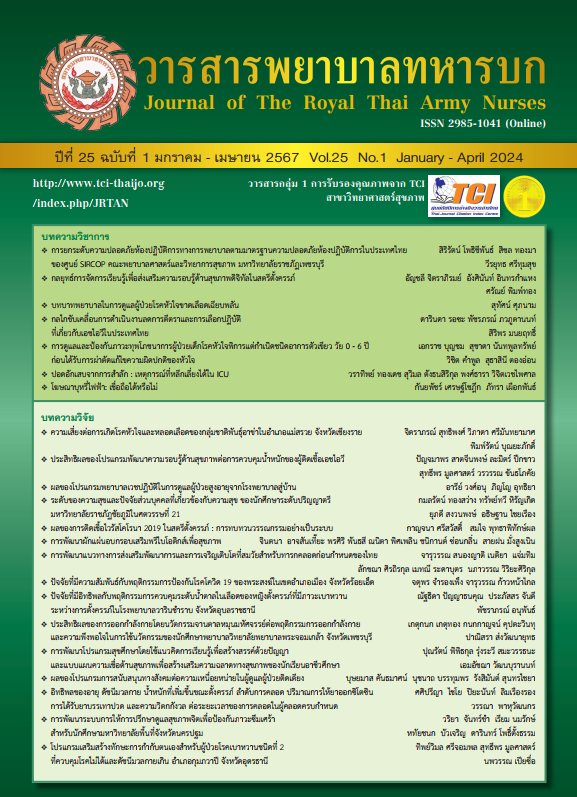Learning Management Strategies to Promote Digital Health Literacy Among Pregnant Women
Keywords:
Digital Health literacy, Learning management strategies, Pregnant womenAbstract
Pregnant women need sufficient health knowledge to practice and reduce risks, enhance their pregnancy care competence, and achieve good health outcomes. Specific health information and healthcare skills are crucial factors that determine good health behavior. Health professionals must explore digital media-based learning strategies to improve health knowledge in pregnant women, making it more contemporary and effective. The author presents a strategy for promoting digital health literacy in pregnant women, incorporating three approaches 1) Self-Regulated Learning Strategies: Encouraging pregnant women to take control of their own learning process. 2) Five Skill Improve Health Literacy: Fostering five key skills to enhance health literacy in pregnancy. This includes organizing learning activities using Bloom’s taxonomy of learning domains. 3)Empowerment: Utilizing empowerment principles rooted in social cognitive learning theory to develop digital health literacy skills in pregnant women. These strategies draw from the foundations of social cognitive learning theory and can be applied to future efforts to improve digital health literacy skills in pregnant women.
Downloads
References
Roma W, Kloyiam S. Thai Health Literacy Survey (THL-S) of Thais aged 15 years and above,2019. Health Systems Research Institute (HSRI). (in Thai)
Downe S, Finlayson K, Tunçalp O, Metin Gülmezoglu A. What matters to women: a systematic scoping review to identify the processes and outcomes of antenatal care provision that are important to healthy pregnant women. An International Journal of Obstetrics & Gynaecology,2016;123(4):529-39.
Bureau of Reproductive Health, Department of Health, Ministry of Public Health. The 2nd national reproductive health development policy and strategy (2017-2026) on the promotion of quality birth and growth. Bureau of Reproductive Health. (in Thai)
The National Strategy Committee. National Strategy 2018–2037. Office of the National Economic and Social Development Board. 2019. (in Thai)
National Research Council of Thailand. 20-year national research strategy and integrated research system reform plan of the country. Nonthaburi: Ministry of public health. 2016. (in Thai)
Waraphok S, Ameporn R, Limruangrong P. Factors influencing maternal literacy in pregnant women. Journal of Thailand Nursing and Midwifery Council. 2020; 35(1):86-98. (in Thai)
Nuampa S, Tangsuksan P, Chunpia C, Wanasathit W. Experiences of Antenatal Care Attendance and Health Information Seeking among Working Pregnancy in the Large Industry: Descriptive Qualitative Study. Nursing Science Journal of Thailand. 2020;38(4):44-61. (in Thai)
Lagan BM, Sinclair M, George Kernohan W. Internet use in pregnancy informs women’s decision making: a web-based survey. Birth. 2010 ;37(2), 106-15.
Sørensen K, Van den Broucke S, Fullam J, Doyle G, Pelikan J, Slonska Z, & Brand H. Health literacy and public health: a systematic review and integration of definitions and models. Bio Medical Central Public Health. 2012; 12(80):1-13.
Pengchan W. Health literacy. In the document health. Nonthaburi: Ministry of Public Health; 2017. (in Thai)
Rodger D, Skuse A, Wilmore M, Humphreys S, Dalton J, Flabouris M, Clifton VL. Pregnant women’s use of information and communications technologies to access pregnancy-related health information in South Australia. Australian journal of primary health. 2019; 25(1):50-5.
Office of the National Digital Economy and Society Commission Ministry of Digital Economy and Society. Digital competence framework for Thai Citizens. 2018. (in Thai)
Office of the Permanent Secretary, Ministry of Public Health. (). Ministry of Public Health Age Group Action Plan 2020-2022. 1st printing. Bangkok: Public Health Administration Division; 2020. (in Thai)
Pengchan W. Health literacy. In the document health. Nonthaburi: Ministry of Public Health; 2017. (in Thai)
Nutbeam, D. Health literacy as a public health goal: a challenge for contemporary health education and communication strategies into the 21st century. Health Promotion International. 2000 ;15(3), 259–67.
Norman CD, Skinner HA.). eHealth Literacy: Essential Skills for Consumer Health in a Networked World. Journal of Medical Internet Research. 2006; 8(2):e9. 17. Jitjaiyen A, Roojanavech S, Nimit-arnun N. The Effects of a Health Literacy Enhancement Program on Health Literacy and Preventive Health Behavior of Prediabetes Type 2 in a Community in Samut Sakhon Province. Journal of The Royal Thai Army Nurses. 2021;22(1):321-30.(in Thai)
Wayo W, Kadsanit K, Konyai J, Chanhuana S, Phromboot R, Zahuang V. The Effects of Health Literacy Enhancement Program on Health Literacy and Prevention Behavior of Hypertension among Community–Dwelling Older Adults. Journal of The Royal Thai Army Nurses. 2023;24(1):43-52. (in Thai)
Tachavijitjaru C. Health Literacy: A key Indicator towards Good Health Behavior and Health Outcomes. Journal of The Royal Thai Army Nurses. 2018;19 (Supplement):1-11. (in Thai)
Bandura A. Social foundations of thought and action: A social cognitive theory. New York: Prentice-Hall. 1986. (in Thai)
Kaewdumkeiang K,Theepejurai N. Health Literacy. Bangkok: New Thammada Printing House; 2011. (in Thai)
Norman CD, & Skinner HA. eHealth Literacy: Essential Skills for Consumer Health in a Networked World. Journal Medical Internet Research. 2006; 8(2):e9.
Nutbeam D. The Evolving Concept of Health Literacy. Social Science and Medicine. 2008; 67(12): 2072-8.
Anderson LW, et. A Taxonomy for Learning, Teaching, and Assessing: A revision of Bloom’s Taxonomy of Educational Objectives. New York: Pearson, Allyn & Bacon; 2001.
Gibson CH. A concept analysis of empowerment. Journal of Advanced Nursing, 1991;16(3): 354-61
Jafree SR, Bukhari N, Muzamill A, et al. Digital health literacy intervention to support maternal, child and family health in primary healthcare settings of Pakistan during the age of coronavirus: study protocol for a randomised controlled trial. British Medical Journal Open 2021;11:e045163.
Suwanampa T, Purksametanan T. Effects of a Mobile Application-Based Health Education Program on Health Literacy in Pregnant Women. The Journal of Thailand Nursing and Midwifery Council. 2023;38(01):98-111.(in Thai)
Downloads
Published
How to Cite
Issue
Section
License
Copyright (c) 2024 Journal of The Royal Thai Army Nurses

This work is licensed under a Creative Commons Attribution-NonCommercial-NoDerivatives 4.0 International License.
บทความหรือข้อคิดเห็นใดใดที่ปรากฏในวารสารพยาบาลทหารบกเป็นวรรณกรรมของผู้เขียน ซึ่งบรรณาธิการหรือสมาคมพยาบาลทหารบก ไม่จำเป็นต้องเห็นด้วย
บทความที่ได้รับการตีพิมพ์เป็นลิขสิทธิ์ของวารสารพยาบาลทหารบก
The ideas and opinions expressed in the Journal of The Royal Thai Army Nurses are those of the authors and not necessarily those
of the editor or Royal Thai Army Nurses Association.






